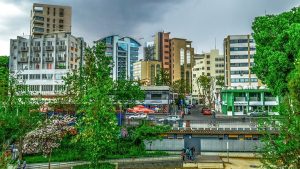
Nicosia, the capital of Cyprus, is internationally known by its Italian name Nicosia (from French: Nicosie). According to Greek mythology, Nicosia was one of the daughters of Achelous and Melpomeni, and its name translates as “White Substance.”
Situated on the banks of the Pedieos River, Nicosia serves as the seat of the Government of the Republic of Cyprus. The Municipality of Nicosia has a population of around 55,014 inhabitants, with the greater urban area of the capital having a population of approximately 240,000. In ancient times, the city was called Ledra and was one of the ancient kingdoms of Cyprus. Throughout its history, Nicosia has been the capital of Cyprus for over a thousand years and has been under the control of various powers, including the Franks, Venetians, Ottomans, and British.
The historic center of Nicosia is enclosed by large medieval walls constructed by the Venetians. These walls are iconic to the city and feature ramparts and gates that once housed important buildings such as the Town Hall. The northern part of the city remains under Turkish occupation, making Nicosia the only remaining divided capital in the world. Despite its rapid growth, the city maintains a high standard of living. Nicosia is home to the University of Cyprus, as well as four other universities.
Nicosia is a significant economic hub with numerous shops, three modern shopping centers, restaurants, and entertainment centers. It is internationally recognized as the wealthiest city in per capita income in the Eastern Mediterranean and the tenth richest city in the world based on purchasing power. The city is the headquarters for five Cypriot banks and is home to over 15 hotels. Nicosia is considered the 185th most expensive place in the world out of 300 international locations. It serves as a trade center and is involved in the production of textiles, leather goods, ceramics, plastics, and other products. Additionally, there are several copper mines in the vicinity. The headquarters of Cyprus Airways is located in Nicosia.
Nicosia is renowned for its cultural attractions. The Cyprus Museum, the largest museum in the country, houses an extensive collection of Cypriot antiquities discovered on the island. The Folk Art Museum of Cyprus, also known as the Nicosia Ethnographic Museum, boasts the largest collection of ethnographic objects in the country, including costumes, pottery, lace, metalwork, woodwork, and paintings. The city is home to numerous art galleries, and the Nicosia Municipal Arts Centre collaborates with the Museum of Contemporary Art, which is situated in the old electric station building donated by the Electricity Authority of Cyprus. Notably, Nicosia hosted the Miss Universe 2000 contest at the Sports Hall Freedom.


